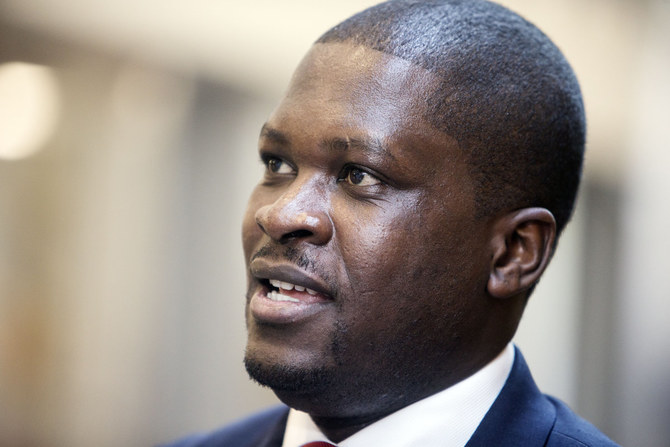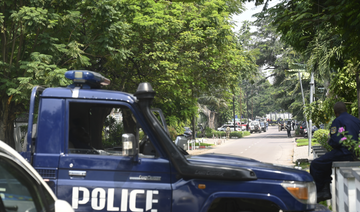SALT LAKE CITY: The friend of a prominent Congolese opposition leader’s son said he turned down a six-figure offer to travel there from the US as part of the family’s security detail in what turned out to be a failed coup attempt.
Marcel Malanga, the 21-year-old son of eccentric coup leader Christian Malanga, was detained by Congolese forces Sunday morning, along with a former classmate from their hometown of West Jordan, Utah, after his father was killed in a shootout while resisting arrest. His high school football teammate, Tyler Thompson, 21, was one of two other Americans arrested after an ill-fated attack on the presidential palace in Kinshasa.
Six people were dead and dozens arrested, including the three Americans, following that attack and another on the residence of a close ally of President Felix Tshisekedi, the Congolese army spokesperson, Brig. Gen. Sylvain Ekenge, said.
Daniel Gonzalez, a former teammate of the two Utah residents caught up in the foiled coup, told The Associated Press that Marcel had offered him $50,000 to $100,000 to spend four months in Congo as a security guard for his politician father. The 22-year-old FedEx worker strongly considered it, but said it lacked concrete details. He ultimately declined so he could spend the summer with his girlfriend.
“I feel really sad for Tyler and Marcel but, at the end of the day, I can just be grateful that I didn’t go because I would be stuck in the same scary situation,” Gonzalez said.
Marcel’s lucrative offer to Gonzalez sheds light on how he might have enticed Thompson to come along on what his stepmother, Miranda, said was supposed to be a vacation.
It was one of many propositions the coup leader’s American son made to former football teammates in what many described as a desperate effort to bring someone with him to Congo. He pitched the trip to some as a family vacation and still to others as a service trip to build wells in drought-stricken communities.
Although it’s unclear whether Thompson was offered money, multiple teammates told the AP that he had alluded to such incentives, telling one friend that the trip could be a “big financial opportunity.”
Thompson’s family insists he’s a political pawn who was dragged into an international conflict under false pretenses. They’ve had no direct communication with their son since the coup and are worried for his safety, his stepmother said.
Marcel’s mother, Brittney Sawyer, said her son is innocent and had followed his father.
Christian Malanga, the slain leader of the Congolese opposition political party, considered himself president of a shadow government in exile, which he called the “New Zaire.” He described himself on his website as a refugee who settled in Salt Lake City with his family in the 1990s, pursuing business opportunities in gold mining and used car sales before eventually moving back to Congo to fight for political reforms.
While campaigning for the Congolese Parliament, he claimed he was jailed and endured torturous beatings. He later published a manifesto detailing plans to reform Congo’s security services and described his movement as an effort to organize fellow emigres against the “current Congolese dictatorship government regime.”
“Marcel was pretty secretive about his dad. He didn’t even know him well until he spent last summer in Africa,” Gonzalez said. “There’s no way Marcel had any idea what he’d be getting us into or he never would’ve offered. He’s one of the best friends a person could have.”
In the early hours Sunday, Christian Malanga began livestreaming video on social media from inside the palace. He is seen with his armed son, who hastily pulls a neck gaiter over his face, looking around wide-eyed. Congo officials have not commented on how the attackers were able to get inside.
Gonzalez, of Herriman, Utah, said he had communicated with Marcel about the financial offer over Snapchat, in messages that have since disappeared, in the months leading up to the coup attempt. He was shocked to learn how the trip played out.
Marcel had told Gonzalez that his father was letting him hire a friend so he would have company during his summer abroad. He seemed excited to be able to offer such a substantial amount of money to a close friend who needed it, Gonzalez explained.
The Malangas had promised on-the-job training, full coverage of travel expenses and the chance to explore a new part of the world while making an income, he said. Marcel insisted repeatedly that it was safe, but didn’t share details about his father’s background.
Neither Gonzalez nor his mother thought the trip would be unsafe, he said, despite the US State Department strongly discouraging travel to Congo — but he turned it down when his girlfriend asked him not to leave for four months.
He later saw private Snapchat videos filmed by Marcel that showed Thompson looking frightened as armed Congolese soldiers surrounded their vehicle. In Gonzalez’s final Snapchat exchange with his friend before their capture, he asked whether Thompson was OK and urged them to stay safe.
Marcel assured him that they were.
Other former football teammates, including Luke Barbee and Jaden Lalor, had heard different pitches about the trip and wondered why Marcel seemed so desperate to bring someone along. Neither could fathom their friends’ possible involvement in a violent attack.
“I consider Marcel a brother to me and Tyler a friend, and I truly believe Marcel’s father must have pressured them for his own wants,” Lalor said. “I just want them back safely.”























